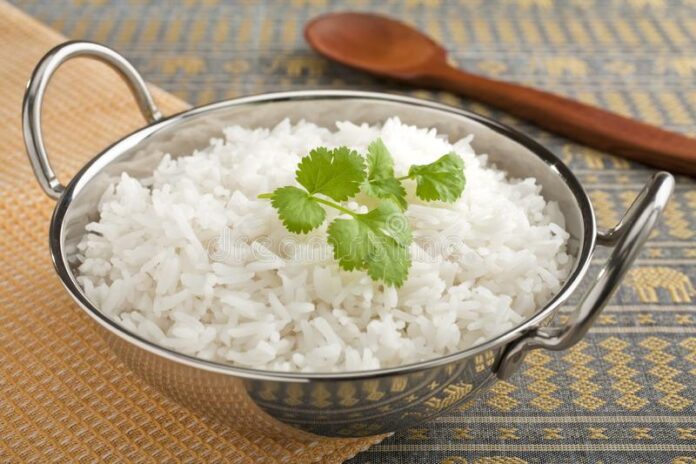Nigerians can’t get their preference. Some food prices shoot up, others down
By Jeph Ajobaju, Chief Copy Editor
Lagosians are finding it had to buy foreign rice as scarcity combines with high price has pushed it off the dining table, two months after Muhammadu Buhari celebrated his pyramid of the national stable in Abuja.
The President said the rice pyramid contained one million bags, a claim disputed by farmers and consumers alike, with farmers saying the bags were either imported or filled with sand.
The price of locally produced rice has reduced 17 per cent. But Lagos residents prefer foreign rice and scarcity has skyrocketed its price across major markets in Nigeria’s most populous state.
The price of 50kg bag of foreign rice (short seed) rose 11 per cent to sell for an average N32,500 in March.
The prices of vegetable oil, beans, tomato, and cooking gas cylinder refill, among other items, had already risen in February compared with January.
A 25-litre keg of vegetable oil, which cost an average N25,000 in February climbed 30 per cent to N32,500 in March.
But a 50kg bag of local rice (short seed) now sells for an average N25,375 against N30,750 in February, a decrease of 17 per cent.
Traders attributed the hike in the price of foreign rice to low inventory and scarcity because of increase in the supply of the local variety.
They said consumers prefer foreign rice despite price reduction of local rice.
__________________________________________________________________
Related articles:
Bakers warn bread price will double – on higher costs
Higher transport costs raise food prices
Food import gulps up nearly N2 trillion
ColdHubs is using solar energy to reduce N3.5tr food waste
_________________________________________________________________
Market survey
The figures came from a market survey by Nairametrics, which shows the average prices of some other household goods between February and March as follows:
- Cooking gas (12.5kg cylinder refill) – from N7,513 to N8,225 (up 9 per cent)
- Vegetable oil (5 litres) – N6,000 to N7,500 (up 25 per cent)
- Vegetable oil (25 litres) – N25,000 to N32,500 (up 30 per cent)
- Tomato (basket) – N367.01 to N393.08 (up 7.1 per cent)
- Potato – N227.23 (up 4.34 per cent)
- Wheat flour – N974.87 to N1,021.7 (up 4.8 per cent)
- Bread – N418.65 to N438 (up 4.63 per cent)
- Maize (50kg bag) – N27,000 (no change)
- Onion (big bag, dry) – N33,500 to N22,250 (down 32 per cent)
- Garri (50kg bag) – N16,050 to N12,250 (down 24 per cent)
- Abuja yam (medium tuber) – N775 to N875 (down 11 per cent)
Consumer Price Index
National Bureau of Statistics (NBS) data shows that the consumer price index (CPI) increased 15.70 per cent year-on-year (YoY) in February, and was a 0.1 per cent uptick on 15.6 per cent in January.
The food price sub-index rose 17.11 per cent YoY in February, but declined 17.13 per cent versus January.
The NBS said increase in the food index was caused by rises in the prices of bread and cereals, and listed other food items which contributed to the increase to include yam and other tubers, oils and fats, and fruit.
The food index rose 1.87 per cent month-on-month (MoM) in March.













